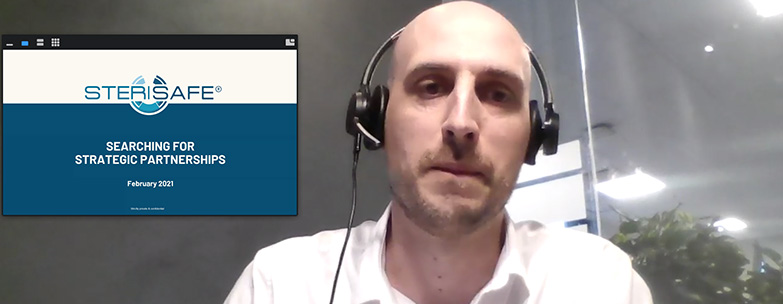How both sides win when start-ups partner with corporates
Start-ups that partner with corporate companies tend to become a lot more innovative. There are alternatives to corporate partnerships for a young company that needs access to advanced tools. The guy you have a beer with at a networking event could become your crucial internal hero, when you partner with a corporate. These were among the central take-home messages at a February 23rd Brew Your Own webinar about strategic partnerships for start-ups presented by Danish Life Science Cluster and Copenhagen Science City.
More patents, more products
When established companies invest in start-ups, the complementary assets they provide are often valuable beyond the invested capital. Investing corporations can provide access to R&D facilities, give legal support to navigate patent approval processes or they could ease the way onto new markets via their distribution network. According to the first speaker, Francesco Di Lorenzo, the primary added value is that established firms help the start-ups to become more innovative. Di Lorenzo is an Associate Professor at Copenhagen Business School. He presented research showing that the collaborations between corporation and start-ups improve the inventive and scientific outcomes of new ventures.
Recent research shows that a Corporate Venture Capital investment is significantly more likely to bring start-ups to the next level. Especially in terms of innovation outcome. Start-ups backed by corporate venture capital file on average from 1 to 1,4 patents more per year than start-ups only backed by venture capitalists. Additionally, a start-up financially supported by CVC is more likely to develop its patents into products as opposed to sell off their IP because of the lack of complementary assets to develop them”: Francesco Di Lorenzo, Associate Professor, Copenhagen Business School.
High tech partnership without losing equity
Access to corporate infrastructure can assure the start-up a better product at a lower cost and reduce the risks inherent in R&D trial and error. None the less, a start-up should assess its own needs very carefully before going looking for a strategic partner. Anne Louise Dannesboe Nielsen is the Director for the Danish Technological Institute. She had drawn up a handy list of qualities to look for.
First of all, think about what you need to get out of a partnership. You should look for a partner whose skills complement your own. Preferably, find someone who is used to collaborating. It is vital, that your prospective partner understands the business you are in, has a network in it, and that they understand the time constraints your start-up operates under. Finally you might think about whether you can access the infrastructure you need at a technological institute instead of giving away equity to a corporate partner”. Anne Louise Dannesboe Nielsen, Director, Danish Technological Institute.
Partners for many purposes
An internal hero in the company he hoped to partner up with has been vital to Eliot Booth in all the successful partnership attempts he has made. He is CEO of the whole room disinfection start-up Sterisafe . Because the Sterisafe technology automatically kills virus, bacteria and fungi, there are too many potential applications for the start-up to study, understand and keep track of. Consequently, the company has looked for partners for research and development as well as sales and marketing.
Making you internal hero look good internally
In every case, the internal hero has been vital to keeping the corporation interested in the partnership. In order to keep the hero interested, it has been crucial for Sterisafe to make the hero look good within the organisation.
One way to make your internal corporate hero look good is to tailor your message in terms the company is familiar with. Read their annual investment report to discover how they talk about themselves. That can be a short cut to talking directly to the corporate mind”. Eliot Booth, CEO, Sterisafe
Go networking long before you need a network
Finding the internal hero in the first place can be a challenge. Eliot Booth advised going to networking events long before you need your network. Sterisafe has never had much luck with cold calls but using contacts made at events, conferences and seminars has proven wildly successful.
One of the best internal heroes we have ever had was someone I met over beers at a symposium about future regulation for the decontamination trade. We got lucky and found a guy who was in the right position. That will not always be the case, but that’s where LinkedIn is your friend. Remember, that you can find almost anybody by looking at your networks network”. Eliot Booth, CEO, Sterisafe
Information, inspiration and motivation
Brew Your Own-events are co-created by Copenhagen Science City and Danish Life Science Cluster. The events aim to provide information, inspiration and an opportunity to network. The hope is to strengthen bonds between researchers and students who dream of starting a business or working for start-ups and founders who have already realized the dream.




